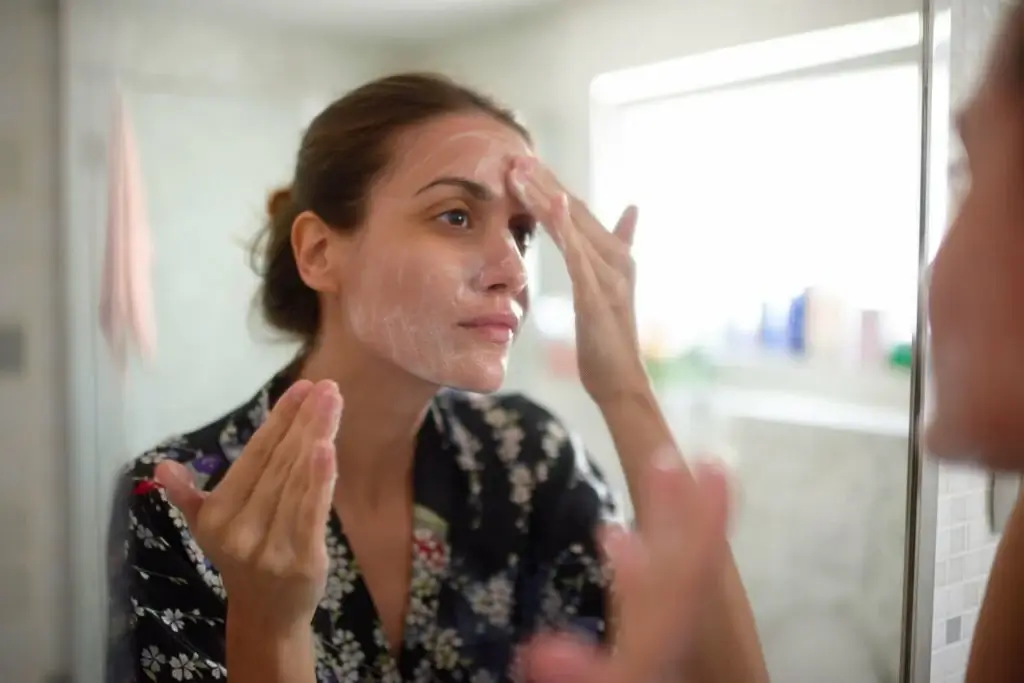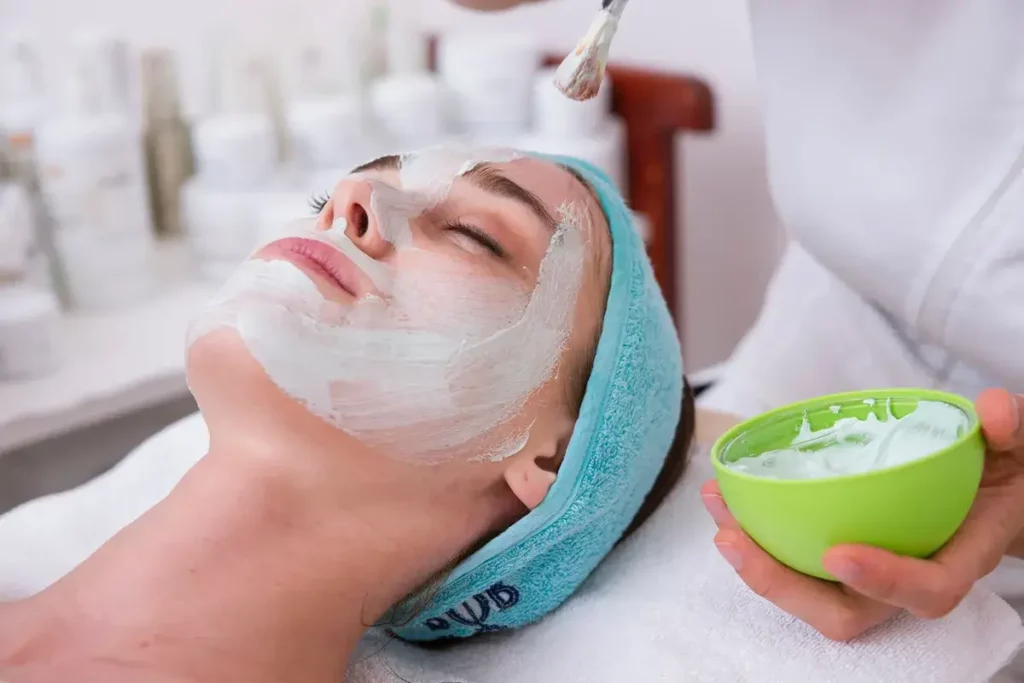Why is it that sensitive skin flares just in time for a first date, a job interview, or a night out? Well, it doesn’t have to be! With a skin care routine specifically designed for sensitive skin, not only will you be able to keep your skin feeling calm with some gentle TLC, but you’ll also be prepared to fight off the early signs of sensitivity.
Best Skin Care Tips for Sensitive Skin

1. Hydrate and Protect
After cleansing, use a gentle alcohol-free cleansing toner to help balance your skin’s pH levels and get your skin ready for the next step in your regimen. Look for a toner with soothing ingredients like chama mox or green tea for soothing and reducing redness. After cleansing, follow up with a light and hydrating moisturizer that won’t clog your pores and won’t cause breakouts. Look for products labeled as non-comedogenic to make sure they won’t irritate sensitive skin.
2. Nourishing and Hydrating with Moisturizers
It is important to nourish and hydrate your skin with the right moisturizer. Make sure to choose a right moisturizer that does not irritate your skin and choose a hygienic, fragrance free moisturizer that will keep your skin hydrated for a long time.
Moisturizers that contain ingredients such as ceramides, hyaluronic acids, and others can help strengthen your skin’s barrier and keep moisture in.
3. Sun Protection: A Must for Sensitive Skin
Everyone needs to protect their skin from the harmful UV rays of the sun, but sensitive skin can be especially sensitive to them. Make sure to use a broad spectrum sunscreen with at least an SPF 30 or higher to protect your skin from the sun’s harmful UV rays.
4. Patch testing new products
When testing new cleansers, moisturizers, or treatments, it’s important to always do a small patch test on a specific area of your skin. This way, you can be sure that the new product won’t cause any side effects or irritation.
5. Maintaining Consistency and Patience
When it comes to skin care for sensitive skin, consistency is key. Give your skin sufficient time to adjust to new products. Don’t be tempted to switch up your routine too often. It might take a while to see results but keep patience to get better results.
Also Read: Difference Between Bronze Skin and Caramel Skin Tone
Some Regular Basis Sensitive Skin Care Routine
1. Remove your Make-up
So how do you say goodnight to party eyes without waking up your sensitive skin? Since sensitive skin is more prone to irritation and redness, it is important to keep friction at bay. A make up remover that is specifically formulated for eyes will contain the perfect blend of ingredients that will dissolve and lift your make-up (yes, even your stubborn waterproof mascara) quickly, effectively and gently, so you don’t have to rub it in.
So how do you do it? Keep your soaked cotton pads over your eye for just a few moments and then whisk away! For added calming benefits, choose ingredients that are anti-inflammatory and soothing to soothe sensitive skin, as well as stimulating your skin’s healing processes.
2. Choose the Best Face Scrub for Sensitive Skin
So, you think a scrub is too harsh for sensitive skin? No, it’s not! Oil, dirt and make-up all irritate sensitive skin and can cause break out, blackheads and inflammation. So, exfoliate your skin weekly to get rid of dirt and grime. The best face scrub for sensitive skin are the ones that are packed with skin-friendly ingredients, like pro-vitamin B5 and vitamin E, which help soften and smooth your skin.
First, test a patch of skin to see if your skin reacts to the scrub. Then, gently massage the scrub into your skin with small circular motions. Rinse with warm water, pat dry.
3. Cleanse Twice a Day (Morning & Night)
Choose a cleanser that’s specifically formulated for sensitive skin. Hyaluronic acid Ceramide It’s no secret that hyaluronic acid has many health benefits, and it’s especially beneficial for sensitive skin that’s prone to irritation. Use lukewarm water twice a day to cleanse. Don’t use very hot water. Too hot can dry out your skin and make it more sensitive.
4. Moisturize (Morning & Night)
Moisturizing is essential for sensitive skin. Start with a light moisturizer in the morning and switch to a heavier one at night. Sensitive skin can be easily triggered by the wrong moisturizer, and the wrong one can clog your pores. Look for moisturizers that are fragrance-free and contain just a few ingredients. Make sure your moisturizer is noncomedogenic and non-allergenic.
Also Read: Tips for Achieving Bronze Skin
5 Common Mistakes to Avoid in Your Sensitive Skin Routine

1. Used Too Many Products
One of the most common mistakes of sensitive skin routine is using too many products. While it’s tempting to try every new skincare item on the market, an excess of products can overwhelm sensitive skin. Stick to a simple routine with a gentle cleanser, moisturizer, and targeted treatments to avoid potential irritants.
2. Skipping Patch Tests
Every skincare product is different, and might not work one person product on another. Skincare products that skip patch tests are a huge mistake. Always test new skincare products on a small area of your face before applying to the rest of the face. This easy step can help you spot potential allergens or irritation and avoid side effects.
3. Ignoring Ingredients Lists
If you have sensitive skin, make sure to read ingredient lists carefully. Some harsh chemicals, Fragrance, and alcohol can irritate your skin. Make sure to use skincare that’s hypo allergenic or specially formulated for people with sensitive skin. Be aware of ingredients that can irritate sensitive skin, like acids or synthetic scents.
4. Over-Exfoliating:
Exfoliation is crucial for healthy skin, but overdoing can harm sensitive skin Also overdoing can remove the skin’s natural barrier, causing redness and increased sensitivity. Limit exfoliation to 1-2 times per week, and opt for mild exfoliants such as lactic acid or gentle scrubs.
5. Neglecting Sun Protection:
Sun protection is a non-negotiable step in any skincare routine. If you don’t use sunscreen regularly? Your skin can become red and skin tone issues. But don’t worry, using sunscreen can help protect your skin and keep it looking radiant and healthy. Choose a broad-spectrum sunscreen with at least SPF 30 and make it a daily habit, even on cloudy days.
Related: Prettiest Skin Tone for All
When Is the Best Time to Start a Skincare Routine?
Start your skincare routine today is the best time to do it. Skincare is a lifelong investment, and the earlier you start, the better you’ll set the stage for healthy, vibrant skin over the long term.
It’s best to start skincare in your teens or early 20s, but it’s never too late. Your skin is the largest organ of your body, and it’s important to take care of it at any age. Beginning your skincare regimen early can help prevent and address common skin issues such as acne, dryness and sun damage. Skincare isn’t just about fixing problems, it’s a form of self care that goes beyond cosmetics and promotes skin health, confidence and overall well-being.
So, no matter what age you are, today is the ideal day to start your skincare journey. Your future glowy self will thank you!
What Is the Best Age to Start a Skincare Routine?
The ideal age to begin skincare routines is usually in your teens or early 20s. This is because hormonal changes and an increase in oil production can cause skin problems like acne. Starting a routine at a young age can help you manage these issues and support healthy skin for the rest of your life.
But don’t worry, it’s never too late! Even if you’ve been neglecting your skin for a while, starting a routine at a later age can still make a big difference.
Teenagers (13-19):
- Focus on a gentle cleanser to address oiliness and potential acne.
- Introduce a light, non-comedogenic moisturizer to maintain hydration.
- Sunscreen becomes crucial to prevent sun damage.
Early Twenties and Beyond::
- Continue with a cleanser and moisturizer.
- Consider adding targeted treatments based on specific skin concerns (e.g., serums for hydration or anti-aging).
- Sunscreen remains a daily essential.


